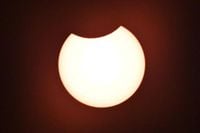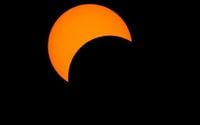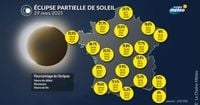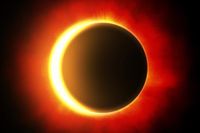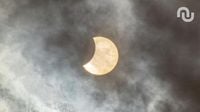This Saturday, March 29, 2025, a partial solar eclipse will grace the skies of France, offering a rare celestial spectacle for both enthusiasts and curious onlookers. The event occurs when the Moon passes between the Earth and the Sun, partially obscuring the solar disk. Unlike a total eclipse, where darkness envelops the day, this phenomenon will merely transform the Sun into a crescent shape, with varying degrees of obscuration across the country.
The eclipse will be most pronounced in the northwest, particularly in Brest, where observers will see up to 32.5% of the Sun obscured. In contrast, southern Corsica will experience only a modest 6% coverage. In Paris, 23.5% of the Sun will be masked, while cities like Lyon and Strasbourg will see around 16% and 15.7% obscuration respectively. Nice will have the least dramatic view, with just 9.9% of the solar disk hidden.
According to the Institut de mécanique céleste et de calcul des éphémérides (IMCCE), the eclipse will begin in France at approximately 11:00 AM local time, reaching its peak around 12:01 PM, and concluding by 12:56 PM. The duration of the observable eclipse will vary between one and a half to two hours depending on the location.
Meteorological conditions are expected to play a significant role in the viewing experience. The forecast indicates favorable weather in the northwest, with clear skies likely over cities like Nantes, Rennes, Rouen, Paris, and Lille. However, those in eastern France, including Strasbourg, Besançon, and Lyon, may face cloud cover that could hinder visibility.
For those in the south, particularly in regions like Perpignan and Marseille, the weather is also looking promising, with the mistral and tramontane winds contributing to clearer skies. Observers in Marseille can expect about 11.7% of the Sun to be obscured at the height of the eclipse.
Safety is paramount when observing such events. Experts strongly advise against looking directly at the Sun without proper protection, as even a partial eclipse can cause serious eye damage. The Observatoire de Paris warns that the Sun's rays can burn the retina without immediate pain, leading to irreversible vision loss. Therefore, specialized eclipse glasses that meet the ISO 12312-2 standard are essential. Regular sunglasses do not provide adequate protection.
For those without eclipse glasses, indirect viewing methods are recommended. One can create a simple pinhole projector using a cardboard box with a small hole, allowing the image of the eclipsed Sun to be projected onto a flat surface. Astronomy clubs across France will also host events with safe viewing equipment and educational activities.
This partial solar eclipse marks the first of 2025 and is particularly significant as it occurs just two weeks after a lunar eclipse on March 14. The next opportunity to witness a partial solar eclipse in France will be on August 12, 2026, when a more substantial obscuration is anticipated, particularly in the southwest, where up to 99.5% of the Sun could be obscured in areas like Biarritz.
Looking ahead, the next total solar eclipse visible in metropolitan France will not occur until September 3, 2081. This upcoming event is a reminder of the rarity and beauty of such astronomical phenomena, encouraging both seasoned astronomers and casual observers to take part in the experience.
As the date approaches, excitement is building among the public. With the right precautions and a bit of luck with the weather, many will have the chance to witness this remarkable event. Whether you're in Brest, Paris, or Nice, make sure to prepare for an unforgettable celestial display this Saturday.
